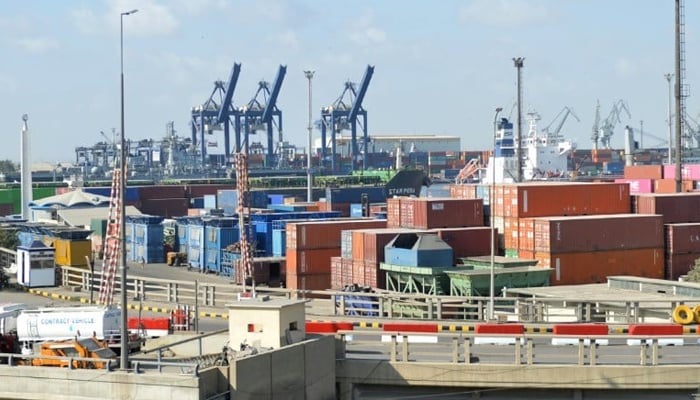Unlocking Pakistan’s export potential
It is imperative for both Pakistan, India to recognise immense economic opportunities that lie in normalisation of trade relations
According to a World Bank study, “Pakistan’s exports have the potential to surge by 80 percent, resulting in substantial impacts on GDP and employment, provided a regular trading relationship with India were in place.” Another study conducted by the World Bank underlines that “India represents up to 85 percent of Pakistan’s untapped trade potential” and stresses that “Pakistan’s goods exports, which amounted to just $31.5 billion in 2022, could have been $25 billion higher had trade with India been realized.”
To facilitate this, two critical steps need to be taken. Firstly, India must reinstate Pakistan’s ‘most-favored nation’ status and eliminate the punitive 200 percent duty on Pakistani imports. Simultaneously, Pakistan must reciprocate by granting India the ‘most-favored nation’ status.
Research work published in Foreign Policy, which is a division of Graham Holding Company (formerly The Washington Post Company), asserts that “The effects would be swift. Under normal trading arrangements, Pakistan’s imports from India, like its exports, would increase significantly. Had Pakistan allowed standard imports from India, they would have helped alleviate back-breaking inflation affecting critical products such as wheat and onions and mitigated the impact on the poor. Given the sensitivity to inflation in South Asia, the political benefits of inflation-reducing imports should not be underestimated.”
Foreign Policy is convinced that India’s potential commercial benefits are far from insignificant. Comparable to its substantial export dealings with Bangladesh, which stands as India’s fifth-largest export market, Pakistan has the potential to emerge as an equally significant or even larger trading partner if trade relations were to normalize.
Trade cooperation should not be misconstrued as a demand for Pakistan, and likewise, India, to compromise on their fundamental interests. It is evident from the economic interactions between China and India, as well as China and Taiwan, that robust trade partnerships can harmoniously coexist with significant international divergences.
Economic history has consistently shown that individual nations may not achieve prosperity, but regions can. It is clear that economic well-being and overall progress are often more attainable at the regional level as opposed to the national level.
In conclusion, it is imperative for both Pakistan and India to recognize the immense economic opportunities that lie in the normalization of trade relations. To harness this potential, it’s high time for both nations to pave the way for a future of unparalleled economic growth and prosperity in the region. The path to a brighter tomorrow is clear – it’s time for India and Pakistan to unlock their trade potential and write a new chapter of collaboration and success.
-
 Jennifer Garner Drops Parenting Truth Bomb On Teens With Kylie Kelce: 'They're Amazing'
Jennifer Garner Drops Parenting Truth Bomb On Teens With Kylie Kelce: 'They're Amazing' -
 AI Is Creating More Security Problems Than It Solves, Report Warns
AI Is Creating More Security Problems Than It Solves, Report Warns -
 'Game Of Thrones' Prequel 'A Knight Of The Seven Kingdoms' New Ratings Mark Huge Milestone
'Game Of Thrones' Prequel 'A Knight Of The Seven Kingdoms' New Ratings Mark Huge Milestone -
 Apple Seeks To Dismiss Fraud Suit Over Siri AI, Epic Injunction
Apple Seeks To Dismiss Fraud Suit Over Siri AI, Epic Injunction -
 Delroy Lindo Explains The Crucial Role Of Musical Arts In Setting Up His Career Trajectory
Delroy Lindo Explains The Crucial Role Of Musical Arts In Setting Up His Career Trajectory -
 Timothée Chalamet Reveals How He Manages To Choose The Best Roles For Himself
Timothée Chalamet Reveals How He Manages To Choose The Best Roles For Himself -
 Princesses Beatrice, Eugenie’s Conflict Gets Exposed As Mom Fergie Takes Over The Media
Princesses Beatrice, Eugenie’s Conflict Gets Exposed As Mom Fergie Takes Over The Media -
 Kate Middleton Plays Rock-paper-scissors In The Rain
Kate Middleton Plays Rock-paper-scissors In The Rain -
 Lindsay Lohan On 'confusing' Teen Fame After 'Mean Girls': 'I Should Have Listened To My Mom And Dad'
Lindsay Lohan On 'confusing' Teen Fame After 'Mean Girls': 'I Should Have Listened To My Mom And Dad' -
 Savannah Guthrie Mom Update: 'Today' Show Sees Huge Ratings Boost Amid Search For Nancy Intensifies
Savannah Guthrie Mom Update: 'Today' Show Sees Huge Ratings Boost Amid Search For Nancy Intensifies -
 Hillary Clinton To Testify In Epstein Probe Alongside Bill Clinton
Hillary Clinton To Testify In Epstein Probe Alongside Bill Clinton -
 Meghan Markle, Prince Harry End Jordan Trip With Meaningful Hospital Visit
Meghan Markle, Prince Harry End Jordan Trip With Meaningful Hospital Visit -
 AI Boyfriends Gain Popularity In China As Young Women Turn To Virtual Romance
AI Boyfriends Gain Popularity In China As Young Women Turn To Virtual Romance -
 Prince William Receives Reality Check As His Media Strategy Fails
Prince William Receives Reality Check As His Media Strategy Fails -
 Zach Braff Reflects On Doing Odd Jobs Ahead Of Major Career Breakthrough In 2001's 'Scrubs'
Zach Braff Reflects On Doing Odd Jobs Ahead Of Major Career Breakthrough In 2001's 'Scrubs' -
 Google Rolls Out Nano Banana 2 With 4K AI Image Generation
Google Rolls Out Nano Banana 2 With 4K AI Image Generation




